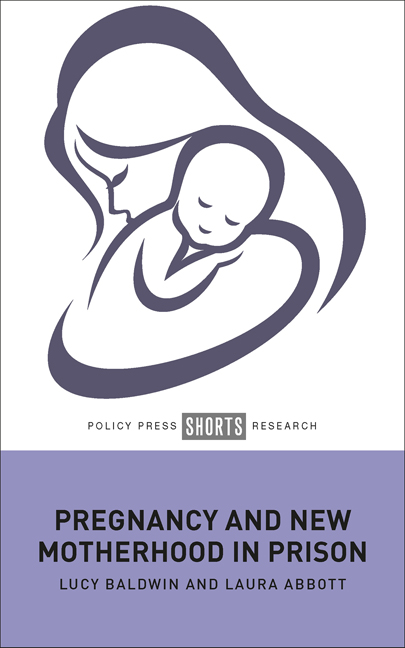Book contents
- Frontmatter
- Dedication
- Contents
- Acknowledgements
- ONE Context and landscape of pregnancy and new motherhood in prison
- TWO How we came to be here: 100 years of criminalised motherhood
- THREE The ‘journey’ to incarcerated motherhood
- FOUR Motherhood confined
- FIVE The persisting pain of incarcerated pregnancy and new motherhood
- SIX Personal experiences of pregnancy and motherhood in prison and the value of the voluntary sector in challenging the system
- SEVEN ‘Learning lessons’: discussion, concluding thoughts and recommendations
- Notes
- References
- Index
SIX - Personal experiences of pregnancy and motherhood in prison and the value of the voluntary sector in challenging the system
Published online by Cambridge University Press: 03 April 2024
- Frontmatter
- Dedication
- Contents
- Acknowledgements
- ONE Context and landscape of pregnancy and new motherhood in prison
- TWO How we came to be here: 100 years of criminalised motherhood
- THREE The ‘journey’ to incarcerated motherhood
- FOUR Motherhood confined
- FIVE The persisting pain of incarcerated pregnancy and new motherhood
- SIX Personal experiences of pregnancy and motherhood in prison and the value of the voluntary sector in challenging the system
- SEVEN ‘Learning lessons’: discussion, concluding thoughts and recommendations
- Notes
- References
- Index
Summary
‘Please let my baby be OK.’
Michelle, 2022Introduction
This chapter offers a view of the needs and experiences of pregnant women and mothers of infants in prison from two women who have lived it, and the charity that supported them during that time and beyond, namely Birth Companions. It considers the value of specialist, voluntary sector provision in prison, the need for scrutiny and for holding the state to account for its provision of care to women and babies in incarceration. It argues the case for a different approach to the sentencing of pregnant women and mothers. Ultimately, like the authors, we believe that, while improvements in the care of women who are pregnant or have recently given birth must be made, the prison environment will never be a safe and appropriate environment for those women and their babies, and that reform of the practices around remand, sentencing and licence recall is essential in order to bring an end to imprisonment for these women in all but the most exceptional of circumstances.
This chapter is co-authored by Samantha, Michelle and Kirsty; three members of the charity Birth Companions, which has specialised in supporting and advocating for pregnant women and new mothers in contact with the CJS for more than 25 years. Samantha and Michelle are members of the Birth Companions Lived Experience Team; a group of over 40 women who are committed to using their experiences of the criminal justice, social services and maternity systems to drive improvements in the care of other pregnant women and mothers. Kirsty is head of policy and communications at the charity, working closely with the Lived Experience Team to influence policy and practice across these systems.
The Birth Companions Lived Experience Team
The Lived Experience Team is a group of volunteers, many of whom have received Birth Companions’ support themselves while in prison or in the community. Members of the team are recompensed for the work they do at the NHS Patient and Public Voice payment rates, in recognition of the expertise they bring to the projects they are involved in, including policy consultations, research, training and resource development. Where payments may have implications for a woman’s welfare benefits, staff provide support on obtaining appropriate advice.
- Type
- Chapter
- Information
- Pregnancy and New Motherhood in Prison , pp. 121 - 144Publisher: Bristol University PressPrint publication year: 2023

